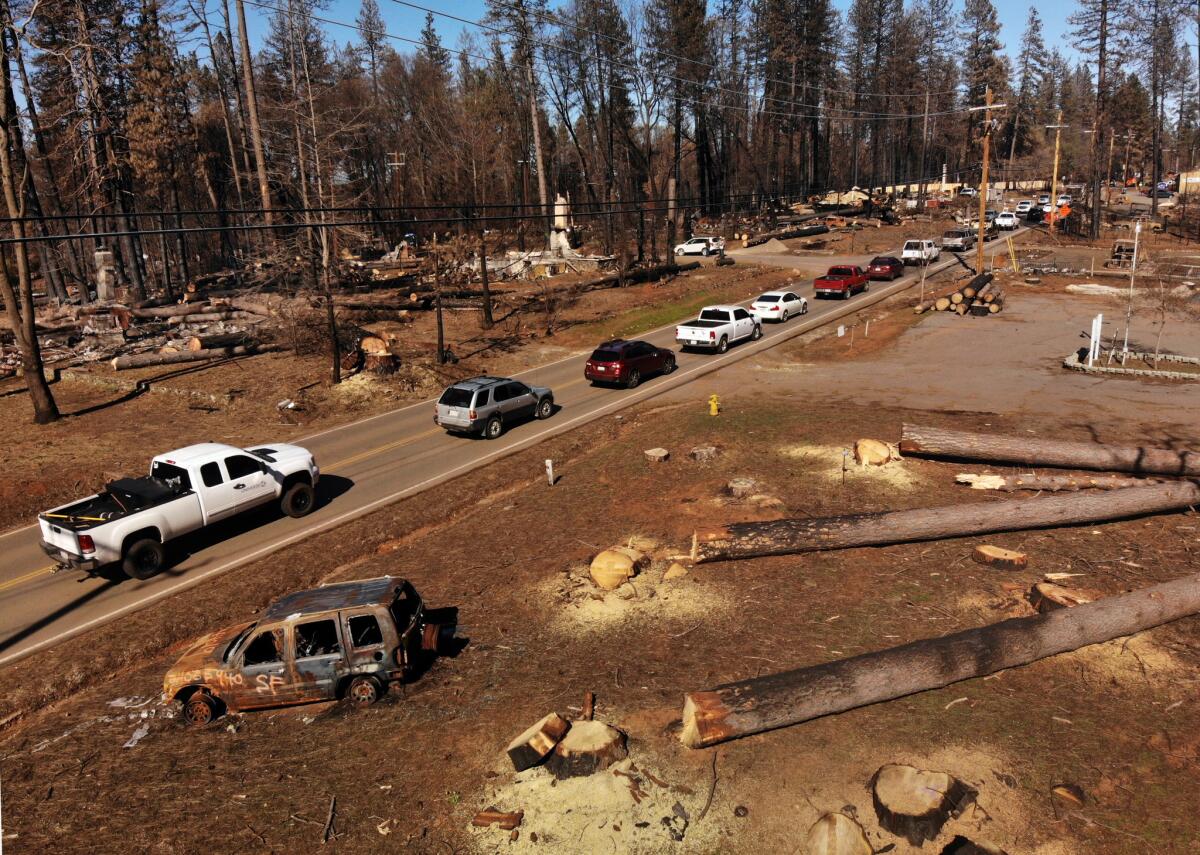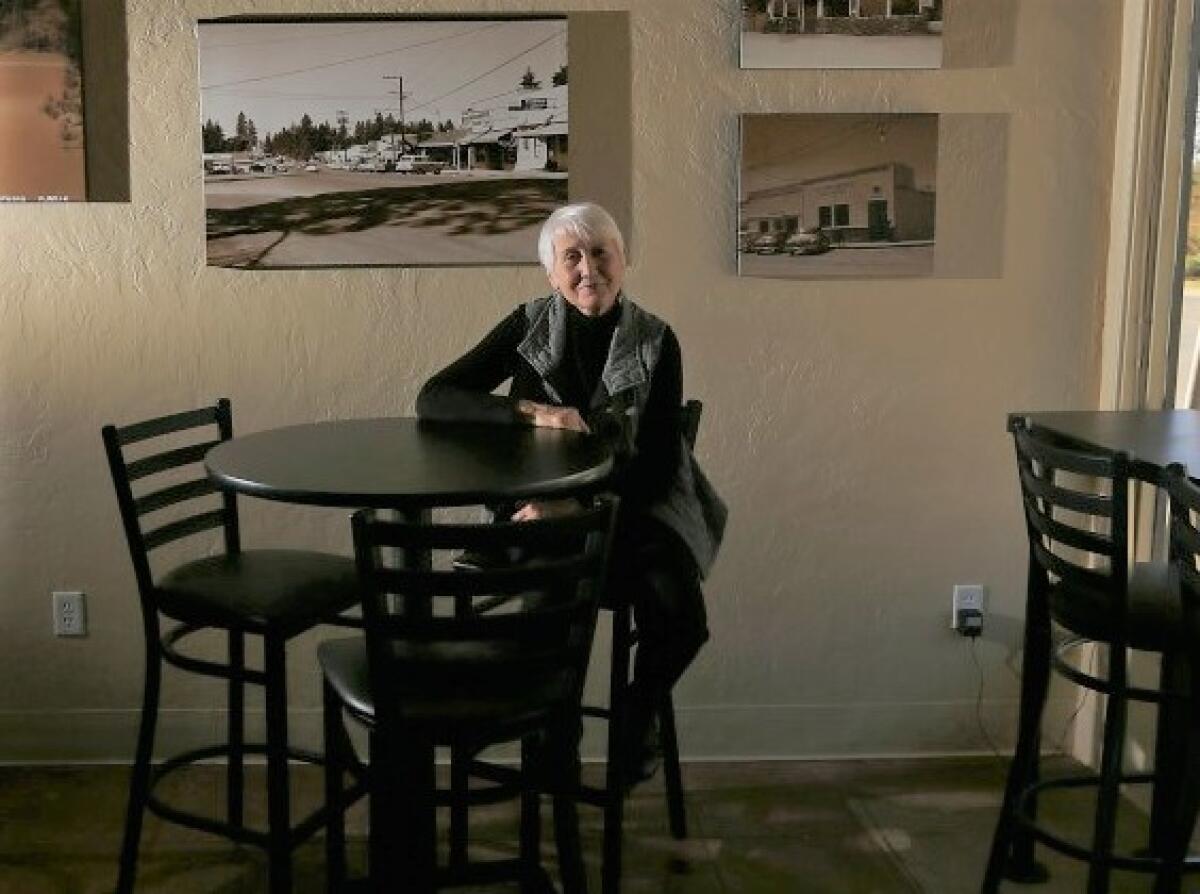The recovery of Paradise was already fragile after the Camp fire. Then came coronavirus

The ribbon cutting last month was the kind of optimistic civic photo op that means a lot these days in the town of Paradise.
With a pair of oversized scissors, a grinning Mayor Greg Bolin sliced a big red ribbon outside the Building Resiliency Center, a new one-stop-shop for the hundreds of people applying to rebuild their homes after the 2018 Camp fire destroyed most of the town.
For the record:
6:10 p.m. March 28, 2020A previous version of this article referred to Tom Taylor as Paradise Unified School District principal. He is the superintendent. Also, the Camp fire’s death toll was 85, not 86.
The ribbon cutting was Feb. 7. City leaders hoped to see the place bustling.
But by mid-March, as California began shutting down public life to slow the spread of the novel coronavirus, the building got quiet. Visits had to be by appointment only, with calls and emails preferred to in-person trips. Staffing was reduced. Employees started wearing gloves.
“It’s been hard because our whole focus was a face-to-face interaction,” said Colette Curtis, a town spokeswoman. “Rebuilding is an emotional thing. People are overwhelmed. We wanted to be able to sit down and literally and figuratively hold their hand during the process. Now, this makes that impossible.”
The already fragile rebirth of Paradise — marked by houses rebuilt, businesses reopening, classes in session at Paradise High School — is being tested by the pandemic.
People have called the town, panicked that the building permits for their homes would not be processed. Businesses are shuttered. Again. The hallways of Paradise High are empty. Again.
Paradise Town Hall is closed to the public. The Gold Nugget Days parade? Postponed indefinitely. The Paradise Chocolate Fest? Rescheduled for September. Hopefully.
There were five confirmed cases of COVID-19 in Butte County as of Friday.
As the Golden State shut down, Paradise officials quickly reached out to Gov. Gavin Newsom’s office to make sure construction was considered essential work, Curtis said. They were relieved to learn it was.
“It is absolutely critical to continue rebuilding and supporting our community because we are in such a vulnerable state,” Curtis said.
“We are still deep, deep in recovery from the fire. We’re still in emergency mode. We considered that an unprecedented disaster, and now we have another unprecedented disaster? ... It’s like, really, when are the locusts showing up?”
On Monday, Pacific Gas & Electric announced in a federal filing that it had pleaded guilty to 84 counts of involuntary manslaughter for the Camp fire, which raced through Paradise in November 2018, killed 85 people and destroyed more than 13,900 homes. The utility acknowledged that its poorly maintained equipment sparked the blaze.
Before the fire, the town issued about 10 permits a year for new houses. In the 16 months since, 694 building permits have been issued. Eighty-one homes have been rebuilt.
Another celebrated return to normality came last August with the return of students and teachers to Paradise High School, which had been smoke-damaged and inaccessible for months. Students spent the rest of the last school year doing course work online, visiting drop-in “labs” at the Chico mall and going to class in a converted warehouse at Chico Municipal Airport.
The school shut down again on March 16 because of COVID-19. It’s unclear if it — or any other schools in California — will reopen before summer break.
Last week, teachers at Paradise High posted a Facebook video of them lip-syncing Celine Dion’s “All By Myself” in empty classrooms.
“We Miss You Bobcats!” it read. “Hope to see you soon.”
“I’m hearing from the kids, ‘What’s next? What’s going to happen next year because we’re going on two years in a row now of school being majorly disrupted,’ ” said Paradise Unified School District Supt. Tom Taylor. “Although, this year, we made it all the way to March.”
The silver lining, he said, is that students and staff have learned to be flexible. And they’re accustomed to online learning.
But one of his staff members told him this week: “Our emotional reserves are running low.”
“We are a very resilient community, and we’ve proven that,” Taylor said. “But how many times can you recover?”
In September, Nicki Jones, 75, opened the first new restaurant to come to Paradise since the fire: Nic’s, a sandwich shop by day and a bar by night.
By March 17, amid escalating stay-at-home orders from the state, Nic’s was doing take-out orders and curbside delivery. Jones posted a picture to Facebook of a meat and cheese board and a bottle of wine with the caption: “Sounds good to me — especially since this old lady is following the ‘older person’ self-quarantine.”
Late last week, she closed the restaurant, thinking that would be safest for everyone.
Jones gave her 15 employees the leftover food and met with each one, assuring them it would be OK. She plans to reopen, whether it takes weeks or months.
“Everybody says, ‘Hey, we’ve been through one traumatic event; we can get through this as well,’ ” Jones said.

Jones lost her home to the Camp fire and is leasing a small house while she rebuilds.
“I’ve been around a long time, and I hope to be around a lot longer,” she said.
Janice Thrash also shut down her food truck, the Patty Wagon, a bright-red rolling restaurant that dishes out charbroiled hamburgers and chili dogs. She bought the truck in January 2019, two months after the fire.
“I survived the Camp fire. I took out my 401K to buy the Patty Wagon,” Thrash told The Times in a Facebook message. “We closed (because) we’re scared, and to protect what little community we had left.”
“With all the news, I felt at least for a few weeks it’s the right thing to do,” she said of shutting down. “I pray it’s for a short moment in time.”
Thrash said she had been scared because the town’s only hospital, Adventist Health Feather River Hospital, was still closed after the fire.
On March 21, Adventist Health launched a new immediate care clinic in its free-standing medical center on Skyway Drive. The clinic is providing weekend care in Paradise for the first time since the fire and allows patients to be seen without an appointment.
The clinic had been in the works for some time, but its opening amid the COVID-19 crisis and concerns about medical shortages only made it more crucial, said Tim Williams, administrative director of physician and outpatient services.
“The timing is very poignant,” Williams said. “In a normal environment, this was needed, but based on everything else, it’s another avenue where we can provide care amidst the chaos.”
In its first week, the immediate care center did a handful of COVID-19 tests, Williams said. The patients did not have the novel coronavirus but did have the flu, he said.
If a patient shows up to the immediate care center with symptoms of the coronavirus, they are isolated and assessed to see if they meet the “strict criteria” of getting one of the limited tests, Williams said.
Williams and his wife and three sons moved to Paradise in July, feeling “called to be part of the rebuilding,” he said. The people who live in Paradise now are still optimistic, even as the world is quickly changing amid the pandemic.
“There’s a lot more room in Paradise,” he said. “Social distancing looks a lot different here than it does in the cities.”
More to Read
Sign up for Essential California
The most important California stories and recommendations in your inbox every morning.
You may occasionally receive promotional content from the Los Angeles Times.











